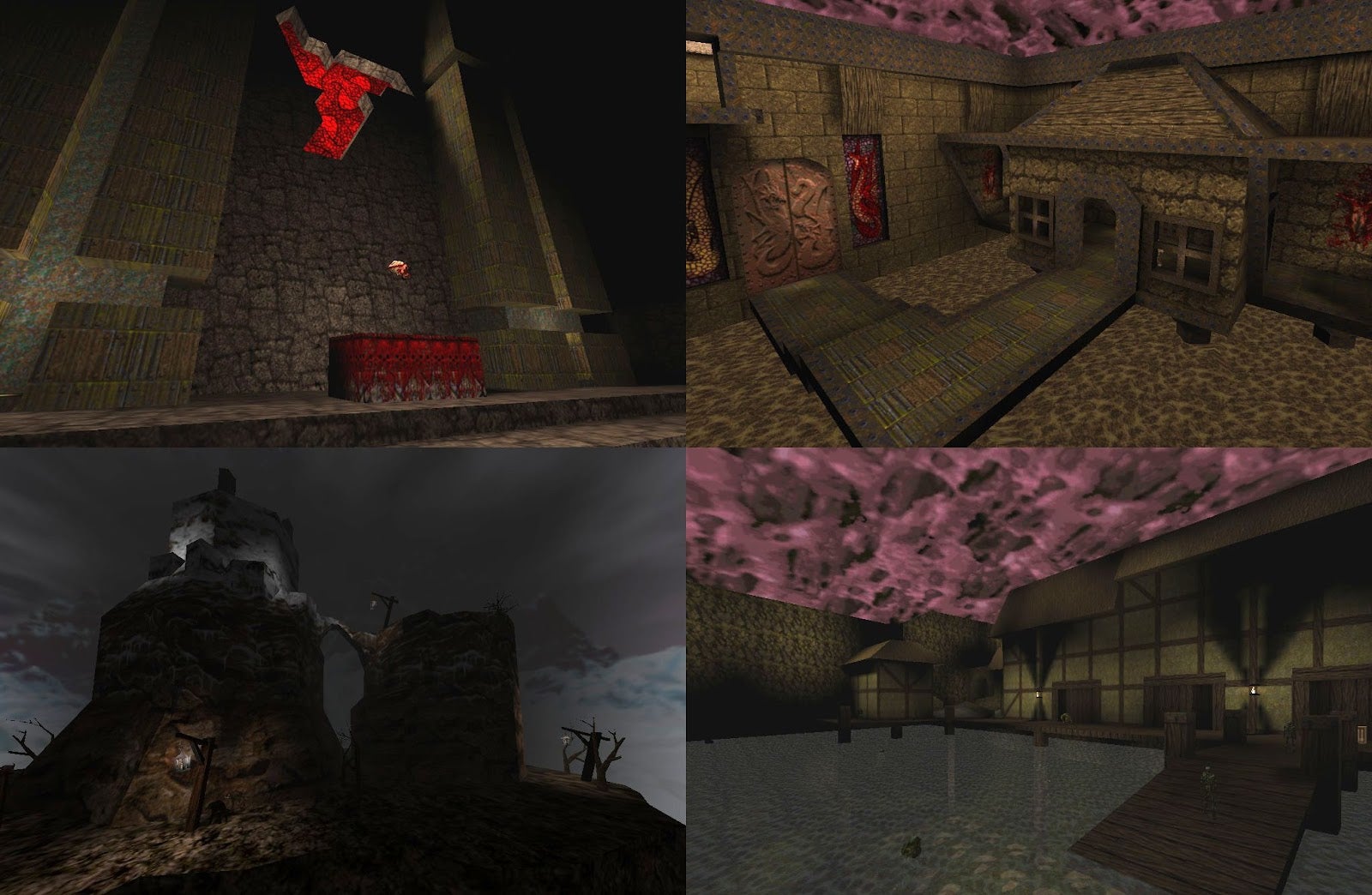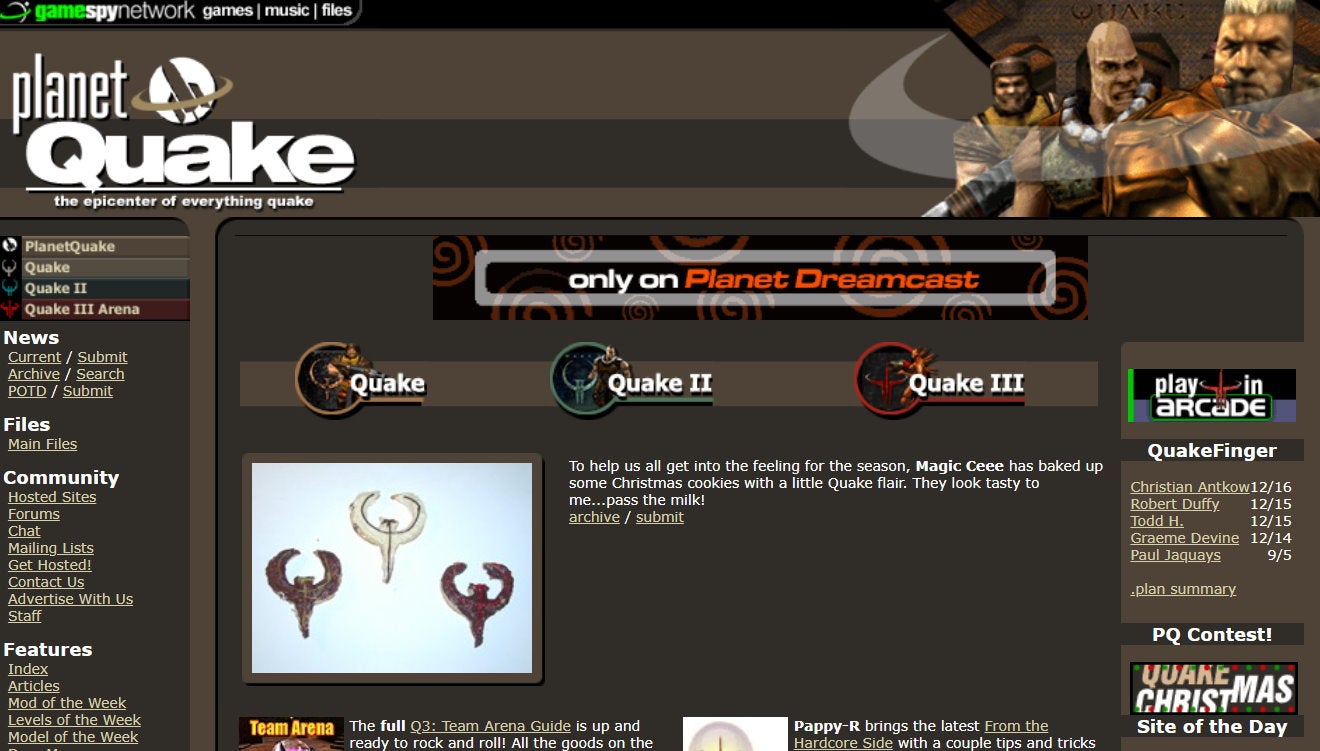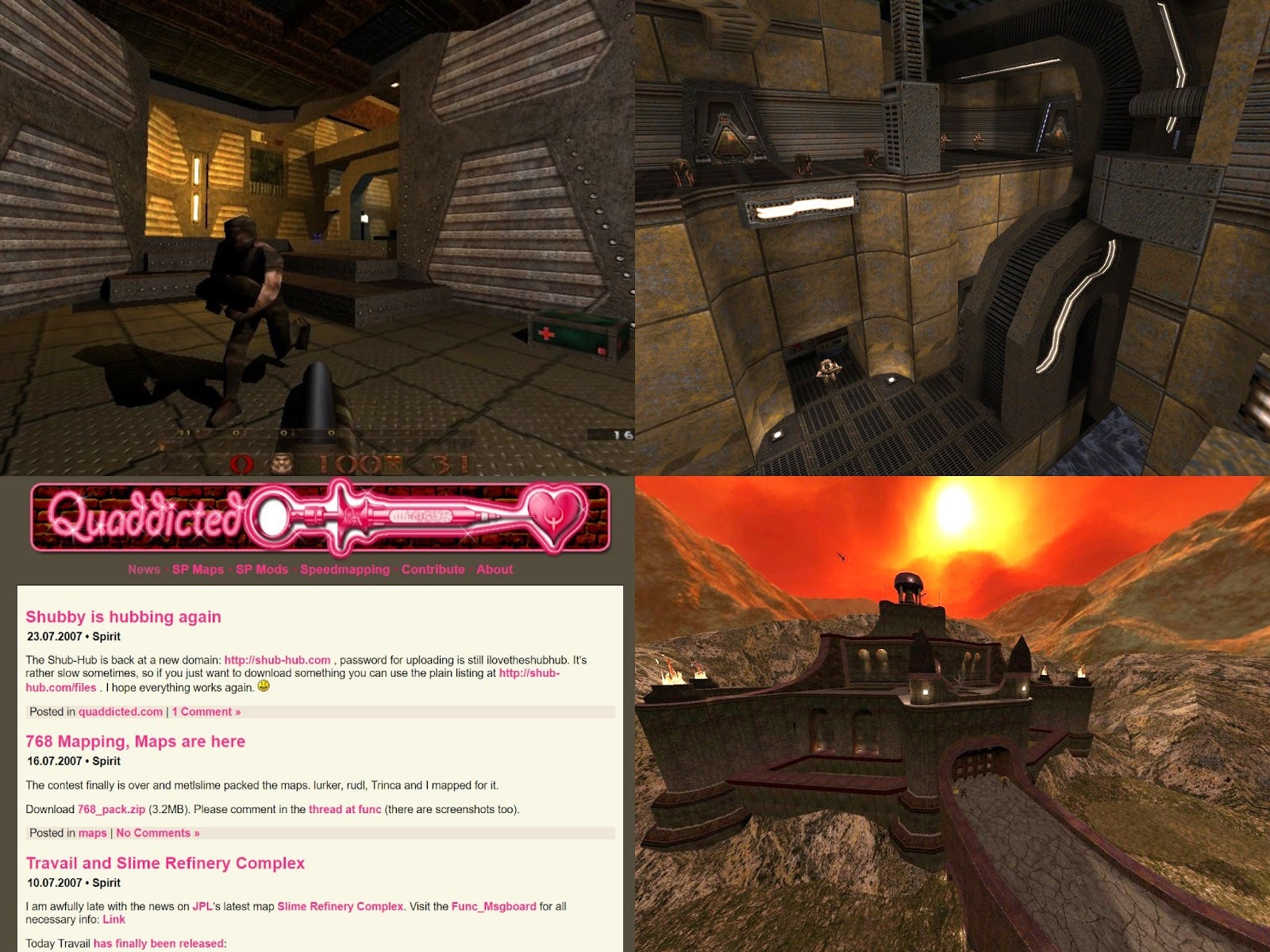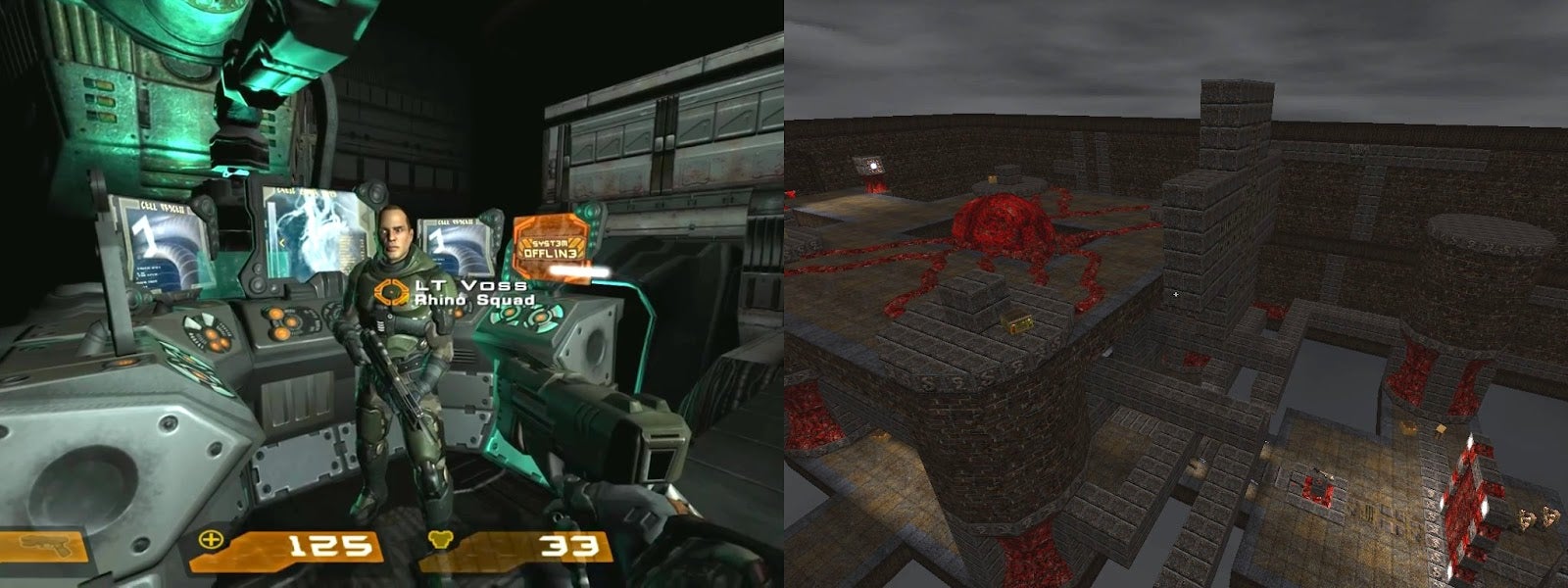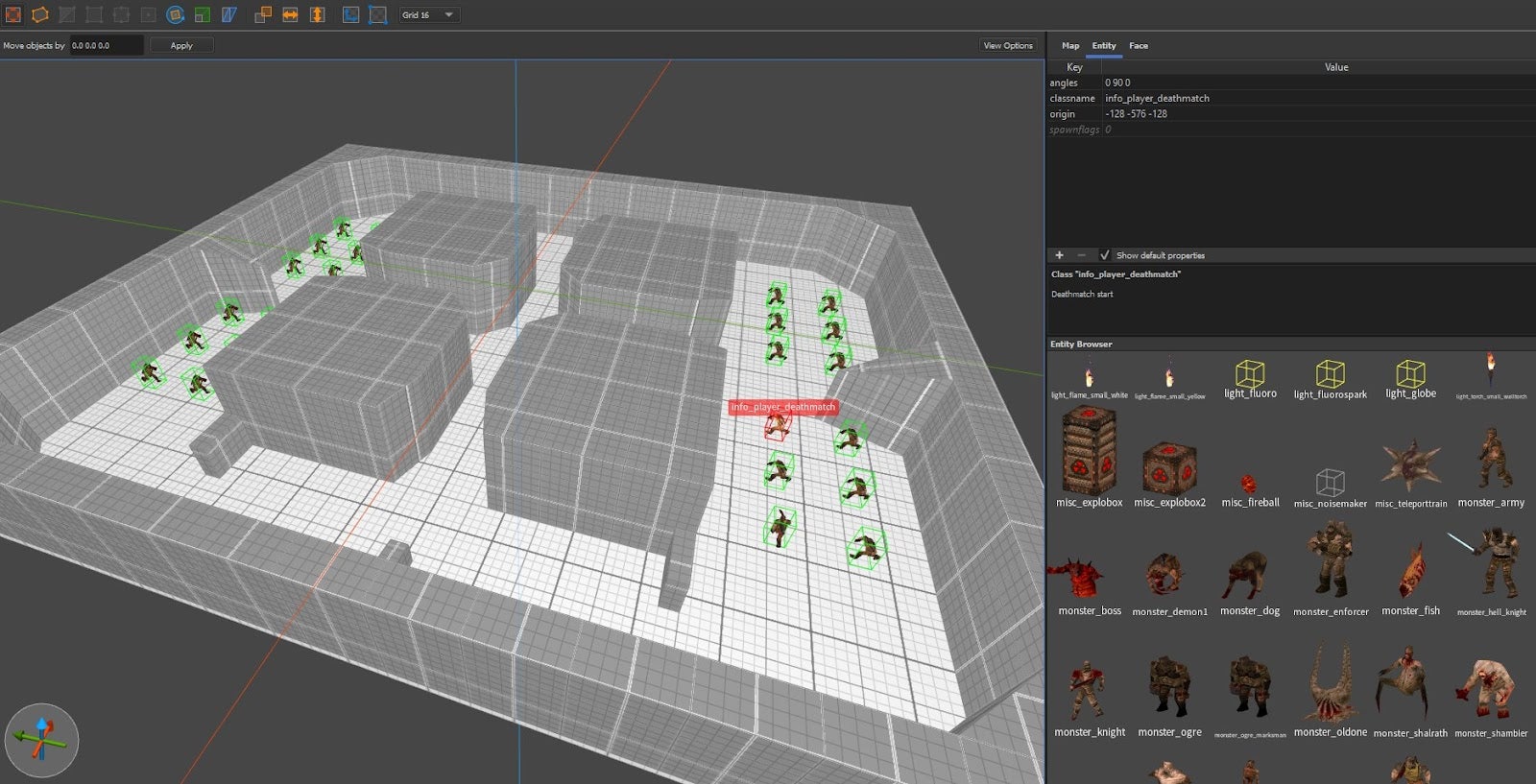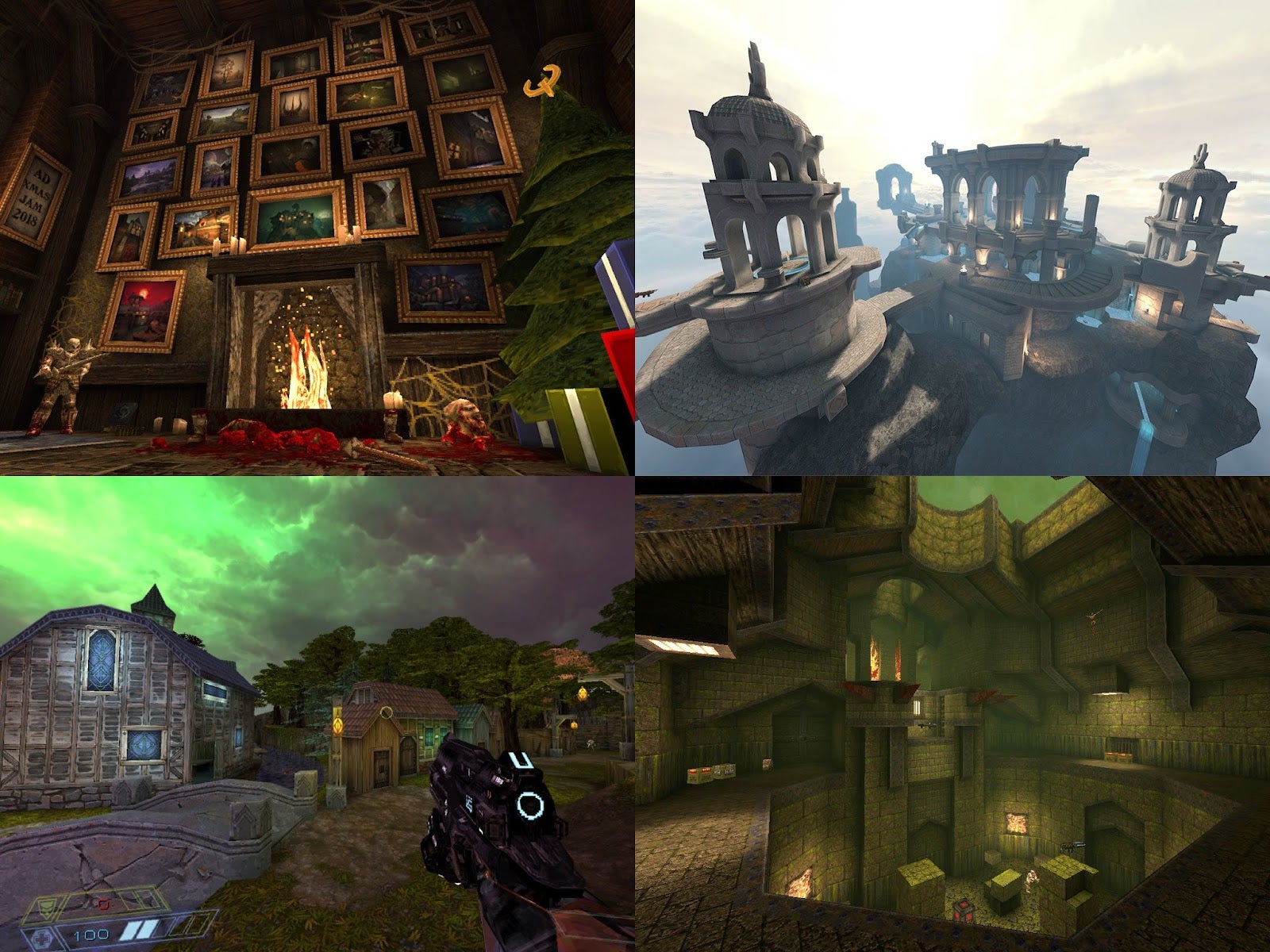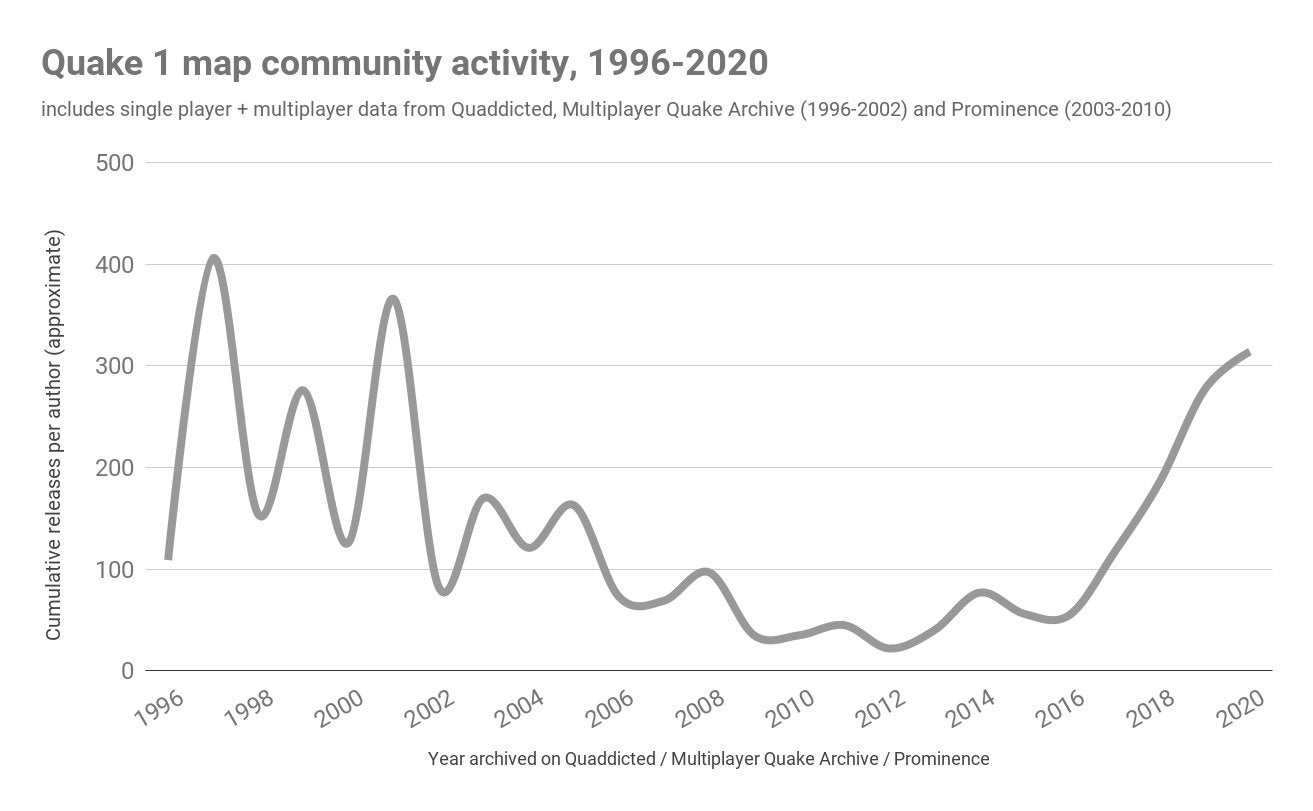Quake 1 modding seemed destined for the same death too. Then a few years ago, a Quake nun started ripping and tearing through the walls. Today, the newly remodeled Quake monastery has thousands of new members keeping the faith alive. This is a short history of the Quake Renaissance, the surprising rebirth of a 25 year old retro game mod community.
Early Quake (1996-2000)
Upon its 1996 release, Quake mapping and modding focused on multiplayer. Sites like Multiplayer Quake (MPQ) and Ramshackle curated hundreds of custom arenas for deathmatch-hungry Quakeworld players. Popular multiplayer mods set standards across the industry: Team Fortress popularized character classes, Threewave CTF popularized capture the flag, and there’s a Rocket Arena game mode in every shooter. Some mods retrofitted other genres onto Quake, like RPG mod Future vs. Fantasy, racing mod Quake Rally, aerial combat mod Airquake, and even a skateboard mod called Kickflip Quake. For a year or two, Quake multiplayer seemed like the hot new platform for young amateur creativity, the Gen-X teen equivalent of Roblox. It felt like the future. But as always, eventually the future moved on. By 2000, only the nostalgic or the hardcore were playing Quake 1 multiplayer anymore. While Quake’s single player mods weren’t as popular at first, they did exist. Fantasy Quake experimented with RPG systems, and Zerstörer bathed in bleak blood-soaked horror. Beyond Belief was an early polished map pack in a classical Quake style, matched only by the sinister mood setting of Shadow Over Innsmouth. The most significant early single player mod was The Nehahra Project: over a dozen levels designed by an all-star team, along with new monsters, side-stepping AI, and cutscenes with voice acting. It also had its own four hour machinima film expanding on Quake’s very rich backstory… It’s, umm, a lot. “Not all of it has aged so well by today’s standards,” says Benoit “Bal” Stordeur, one of the original Nehahra designers back in 2000. “[But] the machinima stuff helped attract players who were less interested in custom maps, it really helped it reach a wider audience.” Nehahra was a spectacle, and required many factors to align. First, a team of online volunteers need shared trust and norms from socializing at early mapper hangout sites like QBoard, QMap, and #terrafusion. Second, “all-star” reputations and critical consensus come from review sites like Prominence and TEAMShambler. Third, no one can / will even download it without hub sites like PlanetQuake and FilePlanet. Every creative community has at least one Nehahra-like project - even if it’s not that good, the hype means the community ecosystem is strong.
Modern Quake (2000-2010)
In late 1999, id Software open-sourced the Quake 1 engine and new Quake engines multiplied. Congregating on Inside3D (now InsideQC), many coders sought to update Quake’s aging graphics. LadyHavoc’s 2002 graphic enhancing engine DarkPlaces became the most popular, paired often with remastered textures from the Quake Revitalization Project. And with every year, Quake looked more modern… with much less multiplayer. “It’s incredibly difficult to get hardcore players to adopt new multiplayer maps,” says Bal. “They are usually a lot more comfortable playing what they are used to.” Gathering at new hub func_msgboard, mapper culture turned away from multiplayer and toward modernizing single player: Insomnia (2000) incorporated Quake 3’s huge sweeping curve, while the landmark Marcher Fortress (2005) mixed a huge Halo-like valley with an epic Quake 3 neo-gothic citadel. This trend later culminated in Altar of Storms’ (2011) audacious recreation of an Elder Scrolls IV: Oblivion dungeon. If you keep trying to make Quake something else, is it still Quake? How “faithful” should we be, and who are the faithful anyway? In 2005, Quaddicted was founded as a new modern community site to try to rebuild and centralize this player audience, eventually evolving into the indispensable map archive it is today. “[I] felt there was no real active hub,” says Spirit, who operates the site along with Negke. “Even back then it was hard to find some of the files when author homepages or file hosts vanished.” “Quakeness” was either modernizing or vanishing, but whatever it was, everyone agreed the 2005 sequel Quake 4 didn’t have it. “Quake 4 is where the brand went off the rails,” John Romero said in a 2016 interview, speaking for many fans. Two popular 2007 mods reacted against modernizing Quake: Warp Spasm is a brutal set of huge “slaughter” maps with hundreds of monsters and frequent “backspawn” ambushes inspired by Doom, while Travail’s first episode makes heavy use of classic style texturing and early Quake homage. The spiritual crisis escalated in 2009 when PlanetQuake and new owner IGN shutdown its community hosting and deleted hundreds of mods and archives. “Planetquake being stabbed to death by IGN,” read the headline at Quaddicted. “I’m numb right now,” commented a PlanetQuake staffer. Now-dormant hubs like QuakeOne.com and QuakeWiki.net made partial backups, but it already felt like the end of history. Months later, mapper Dustin “Tronyn” Geeraert wrote the first Quake community history, “The Lingering Legacy of id Software’s Quake: A Glimpse Into Thirteen Years Of Darkness”. He was pessimistic too: “[Most] of us who are here seem to have started in the late 90s, and sort of stagnated in the early 00’s,” Tronyn said in a 2009 interview. “I doubt there will be new Q1SP maps being shared and people discussing them online in ten years.”
Quake Renaissance (2010-now)
Quakespasm debuted in 2010, eventually becoming the most common Quake engine today. Modern yet “faithful”, it ignores DarkPlaces’ graphics updates and re-commits to retro-style unfiltered pixels. This revised nostalgia defines the Quake Renaissance. In his book “Handmade Pixels: Independent Video Games and the Quest for Authenticity”, Jesper Juul analyzes the stereotypical indie pixel art platformer from an art history lens. Juul notes that back in the late 1800s, the Arts and Crafts movement argued that industrialization had led to soulless inhuman art. Similarly, indies rejected AAA industrial photorealism and instead tied their crispy handmade pixels to homemade authenticity - even though old CRT monitors actually softened and blurred pixels. Our nostalgia for crisp pixels is a modern invention to suit the present, as with any other renaissance. But revision isn’t bad. Ben “Makkon” Hale’s 2020 Quake textures perfectly fuse past and present, using modern tools like Substance Designer to generate obscenely detailed high-res floor and wall textures - all designed for Quake’s 256 color palette as unfiltered pixel art. “His textures are unlike anything that could have been made at the time of Quake’s release,” Bal says. “I saw his texture work on Twitter and instantly told him how great they would be in Quake maps.” Makkon remembers: “He showed me how it looked [and] seeing that screenshot got me so excited,” he says. “I hadn’t realized just how far Quake had come. I picked up TrenchBroom…” Since its v2.0 release in 2017, TrenchBroom has become the most widely used level editor for Quake. It’s so good that some designers even use it outside of Quake to make commercial Unreal Engine games. “We aim to the make the editor as consistent and user friendly as we can, and we want to enable fast workflows by getting out of the way,” says Kristian “SleepwalkR’ Duske, creator and co-maintainer of TrenchBroom. “Make simple things easy and difficult things possible, is my motto.” “One of the unique things among Quake editors is you can do everything in the 3D view,” says Eric “ericw” Wasylishen, co-maintainer of TrenchBroom. He also credits good documentation and community support for its widespread adoption. To learn TrenchBroom in the 1990s, you would’ve crawled through some articles on PlanetQuake. But today, for better or worse, learning starts on YouTube. And since 2018, modder David “dumptruck_ds” Spell has made dozens of slickly-produced video tutorials for Quake modding. His “Mapping for Quake: TrenchBroom 2 Quickstart” video has over 50,000 views. Yet a video tutorial can’t replace a patient mentor willing to answer questions. As with many online communities, some of the more hardened parts of the Quake community can be quite crusty, unpleasant, and downright abusive, often pushing away newcomers and even many regulars. Fortunately, the community also realized the need for better inclusion and created a new social hub: the Quake Mapping Discord, a highly moderated “safe for school” public space where cursing isn’t allowed but beginner questions are welcome. Since 2018, it has unexpectedly grown to thousands of members interested in making custom content for a 25 year old game. It’s now basically the center of the Quake single player mod community today. “There’s still ways to go, but I feel it’s a lot less toxic than it was 10 years ago,” says SleepwalkR. “The community has diversified into different pockets that have different cultures — there is something for everyone now.” Some mods hew to 1996-era memory limits, others toy with stealth or even ignore combat entirely, and then there are those who generate poetry or quote the Black activist Audre Lorde. Quake is no longer just one thing, there are now many Quakes. This focus on a more inclusive community owes a lot to indie game jam culture. Starting in 2014, casual online events like func_mapjam, Retro Jam, Xmas Jam, and newly revived Speedmap jams, lowered a decade of expectations while also breathing new life into the community. Everyone participates together, from beginners to masters. All these new resources, tools, community, and energy is what makes this tidal wave of new projects possible. For instance, Bal’s gargantuan open world water temple “Tears of the False God” (2020) was in some sense a huge group effort - textured by Makkon, built in TrenchBroom, tested on Quakespasm, downloadable from Quaddicted, and announced on Quake Mapping Discord - all only after Bal honed his skills in several map jams himself. It is, perhaps, the culmination of the Quake Renaissance. But it’s not the only jewel of the renaissance: Tears itself is part of Arcane Dimensions (2015-2020), a mega Nehahra-like spectacle mod with nearly two dozen huge sprawling worlds built by an all-star team, prompting the only perfect 5/5 user score on Quaddicted. Copper (2019) is a popular “refinement mod” with a fantastic 6000 word essay on Quake’s design. Slayer’s Testaments (2020) continues the brutal Quake 1.5 tradition, mixing Quake with Doom Eternal style rip and tear. And Quake speedrunning has seen its own renaissance in recent years, with revolutionary techniques and broken records. To try to measure the renaissance, I analyzed map archive data from 1996-2020. For each year I added together the number of authors per release, so a map pack by one author = +1, a map pack with 4 authors = +4, etc. My admittedly amateurish statistical method under-represents early big lone author mods, and overcounts re-uploads and patches in later years. But look at that curve! It’s like the 90s again! Quaddicted’s self-described “archival zealot” Spirit isn’t impressed. “If you build it they will come - maybe, maybe not,” he says. “Public interest can come and go.” And he’s not wrong; Quake exists in its own dimension, disconnected from the larger industry. Previously I wrote about how modding leads many to work in games, yet these older retro modders often have no industry aspirations, or even already work in the industry. “It’s comfortable as a leisure activity, frankly,” says modder Matthew “Lunaran” Breit, who also worked on Quake 4 multiplayer and The Beginner’s Guide. “Levels and assets don’t take forever - unless you make them take forever.” “It’s very different from my day job, where we’ll nitpick on details all day, and work on multi-year projects,” says Bal, who also works as a AAA character artist. “One of the things I love with modding and Quake is that we can really experiment, and we’re allowed to fail.” Quake modding symbolizes the opposite of work - it is life. And ultimately this is what the Quake Renaissance is about: when our communities control our own games - from the source code and tools, to the social hubs and archives - we can reinvent it as necessary, and through it, reinvent ourselves too. NEXT TIME: Part 3, a guide - how to join the Quake Renaissance today.

